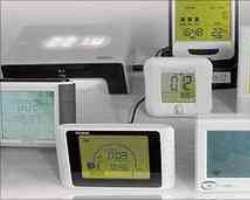SMART METERS ‘MAY NOT CUT ENERGY USE’

The UK plans to offer energy monitors with all smart meters installed in people's homes
Q&A: Smart meters
Installing smart meters may not result in households saving energy, a study has suggested.
Smart meters had been considered as one component in an infrastructure to help use energy more effectively, and cut bills and emissions.
Research by a University of Oxford scientist found that the devices alone were unlikely to lead to an overall reduction in the demand for energy.
The findings appear in the journal Building Research and Information.
“A lot of us are using gas and electricity without realising we are using it,” explained author Sarah Darby from the university's Environmental Change Institute (ECI).
“If you had a wood fire and went away for the weekend, then the fire would go out. However, if you leave the central heating or electrical appliances on when you go away, you may be none the wiser.”
Continue reading the main story
Related stories
Q&A: Smart meters
Plans for smart meters published
It is why, Dr Darby added, the “feedback effect” (which tells people how much energy was used over a period of time, or how much energy a particular activity/appliance consumed) in energy demand reduction was so important.
“Helping people who wanted to save energy use the information they could get from their metering and bills was an important part of that feedback,” she told BBC News.
“Using the old-style meter means that you have got to be fairly diligent to do that – even if you do check it every day or month, it does not give you a breakdown of how you are using the gas or electricity.”
Definition dilemma
However, she observed, there was still a lot of confusion of what a smart meter was, despite the devices being hailed as key in the effort to curb energy use in the UK.
Old-style metering made it very difficult to understand where people were wasting energy
“It is possible to have a smart meter that does not have a display on it at all, in fact most smart meters don't,” she explained.
Citing Italy and Sweden as exampled, she said: “They are not being rolled out with the aim of giving customers better feedback, except that the households will get an accurate bill whereas in the past they might have got an estimate.
“But in [the UK], it is part of government policy that smart meters will be rolled out with real-time electricity displays.”
The UK government policy involves installing smart meters in more than 27 million homes and two million smaller non-domestic sites over the next decade.
In a consultation document published in August, the Department of Energy and Climate Change (Decc) and energy regulator Ofgem said better information would allow household to cut their energy use.
Dr Darby agreed that smart meters were an important development: “What I am saying in this paper is smart meters can be used to help use their energy consumption because they will get [accurate] bills, and because it is possible for them to have a breakdown about their energy use.”
However, she added, “There is no inevitability about this. Smart metering can be introduced in such a way where people do not get the feedback effect, in which case you lose that benefit of the technology.”
But she quickly added that the meters had the potential to offer more that just “feedback to customers”.
“Essentially, a smart meter is a meter with communications technology. You can use that technology in different ways: it could turn your water heating on and off, according to the needs of the utilities, to fit in with load balancing.
“For example, at a time of peak demand, the utility company could switch off your water heater and they would offer you a special tariff to be allowed to do that. Instead it would switch on your immersion heater at a time of low demand.”
Dr Darby said that this could be vital progress towards developing a more effective electricity distribution system in the future.
“It may not reduce the overall use of electricity, but it would allow the suppliers to manage loads on the system more effectively – especially as the balance between supply and demand gets tighter and, particularly, as we get more renewables on the system; if the wind is blowing then you want to make the most of it.”
Savings questioned
In the effort to curb climate change, the consultation document says that initial government estimates suggest that smart meters could save around 34m tonnes of CO2 emissions over a 20-year period as people become more aware of the energy they were using.
Currently, according to government figures, households account for 26% of the UK's energy use and CO2 emissions. It has also calculated that in excess of £900m of electricity is wasted each year as a result of appliances being left on standby.
However, another paper in the Building Research and Information journal warned that the benefits of smart meters could become less effective over longer periods of time.
Dutch researchers questioned the findings of studies around the world because they were often only conducted for a relatively short-period of time – four months or less.
When the team from Delft University of Technology carried out a study that lasted for 15 months, they found that early energy savings were lost unless the features provided by smart meters became incorporated into consumer habits and routines.
The Decc/Ofgem consultation lasts until the end of September, and the government is planning to give the green light to the roll-out programme in mid-2012.
